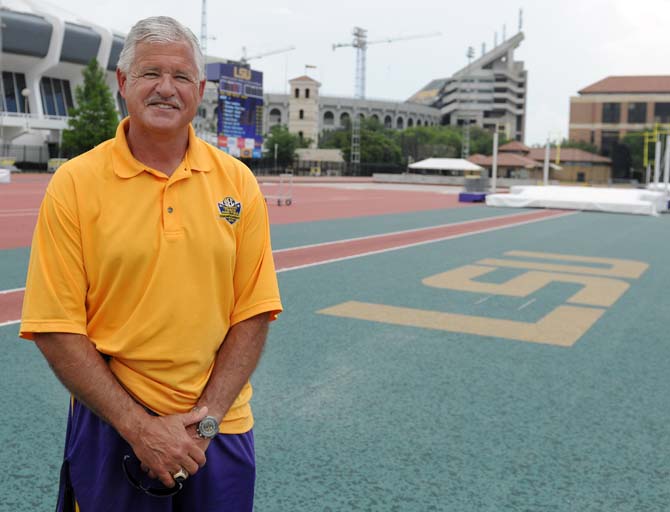Even if he does not like to acknowledge it, LSU track and field coach Dennis Shaver is normally the first person to arrive at the Bernie Moore Track Stadium and the last to leave.
Shaver estimated he and his assistant coaches spend between 20 and 25 hours a week at the track during the indoor and outdoor track seasons. He said he likes to spread out the team’s workouts in order to work closer with each specialized group of athletes, even if it means more time at the track.
“He’s always the first one here,” said senior sprinter Siedda Hebert. “Don’t tell him this, but I don’t think he gets much sleep. I think that makes him a great coach overall.”
Shaver came to LSU as an assistant coach from Auburn in 1995 and took over as the Tigers’ head coach in 2004.
Since then, he has been named the NCAA Women’s Outdoor Coach of the Year twice and the Southeastern Conference Women’s Coach of the Year seven times. He’s produced 19 NCAA Champion relay teams and 39 NCAA Champion athletes.
Shaver said his favorite part of coaching is the looks on the faces of his student-athletes who were a part of those teams.
“You don’t always have that opportunity to win team championships but we’ve had our share where we we’re there to be a part of it and share it with the athletes who made those sacrifices,” Shaver said. “They really bonded together and worked toward a common goal which is what makes those championship teams so special to me.”
Some of those athletes continued working with Shaver after they graduated and went on to compete at the highest level of track and field — the Olympics. Shaver has sent 22 athletes to the Olympic Games, with six bringing home medals.
Shaver said he is always proud to be able to help his athletes reach the highest level even if they are no longer donning purple and gold.
“It’s the ultimate goal of any track and field athlete,” Shaver said. “It’s hugely gratifying because it is so challenging just to be able to qualify to participate in those games. We’ve been fortunate to have people who have been able to do that while continuing to train as a part of our program.”
Despite his success, Shaver has not changed his routine and can still be seen putting in a lot of grunt work around the track, helping the managers set up hurdles and other events around the track.
“We pretty much run the show,” Shaver said. “Our managers do most of the work setting up the meets, but we do all of that.”
In addition to setting up the events, Shaver will deal with problems that arise during the meet. Hebert said Shaver is technically savvy and often repairs equipment around the track.
“He’s a coach and a handyman,” Hebert said. “If there is anything broken you will always find him on the track trying to fix it early before or late after practice.”






